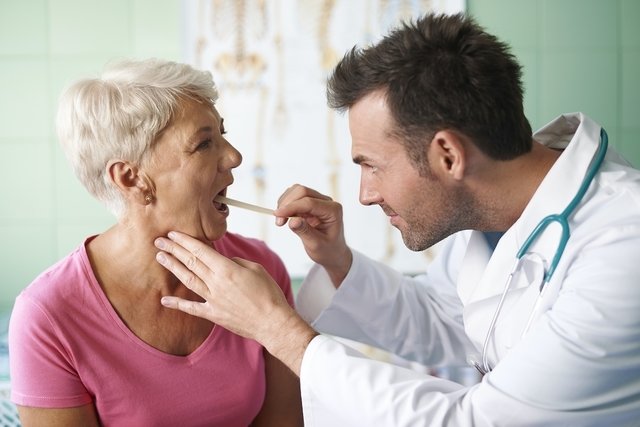A sore in the throat is when a small rounded wound appears, whitish in the center and reddish on the outside, which causes pain and discomfort, especially when swallowing or speaking. Furthermore, in some cases, fever, general malaise and enlarged lymph nodes in the neck may appear.
Generally, a cold sore in the throat occurs after periods of stress, strong emotions or injuries to the mouth, but it can also be caused by infections, such as herpes, or the use of some medications, such as anti-inflammatories. When canker sores are very large and take a long time to heal, they may indicate more serious problems, such as HIV or cancer.
In the case of frequent throat ulcers that take a long time to heal or are accompanied by other symptoms such as fever and weight loss, it is important to consult a gastroenterologist or general practitioner to identify the cause and initiate appropriate treatment.

7 causes of sore throat
The main causes of sore throat are:
1. Aphthous stomatitis
The canker sores that occur in aphthous stomatitis do not have a specific cause and generally only cause pain in the place where they appear. However, they often appear after minor injuries in the mouth, periods of stress or emotion, and menstruation.
In addition, iron or vitamin B12 deficiency, allergies to products such as toothpaste or dental fluoride, and foods such as citrus fruits and cinnamon can also cause aphthous stomatitis.
What to do: canker sores caused by aphthous stomatitis tend to improve without any specific measures within 3 weeks. However, in case of severe pain or difficulty eating, it is recommended to consult a general practitioner, who may recommend medications such as ointments containing anesthetics and corticosteroids, which help alleviate discomfort. See other tips that can help improve canker sores.
2. Herpes
The virus that causes cold sores can also cause painful sores on the throat, tongue or roof of the mouth, in addition to small blisters on the lips. Better understand the symptoms of herpes on the tongue and mouth.
These symptoms may also be accompanied by fever and malaise when the infection occurs for the first time, and tend to be milder the following times.
What to do: canker sores caused by herpes tend to improve in about 2 weeks without specific treatment. However, if symptoms such as fever, malaise or severe pain occur, it is recommended to consult a general practitioner to confirm the diagnosis. In these cases, medications such as antivirals and analgesics may be indicated to alleviate symptoms and help the cold sore to improve more quickly.
3. COVID-19
Infection with SARS-CoV-2, which causes COVID-19, can also cause cold sores in the throat, due to factors such as the intense inflammation that the infection causes and the direct effect of the virus on the oral mucosa.
However, other more classic symptoms such as cough and fever may also be present. See the main symptoms of COVID-19.
What to do: It is important to consult a general practitioner, pulmonologist or infectious disease specialist if COVID-19 is suspected, because the use of medications such as dipyrone and specific antivirals may be indicated. In severe cases, hospitalization may even be necessary. Check out how COVID-19 is treated.
4. Use of medications
The use of some medications, mainly non-steroidal anti-inflammatory drugs, such as piroxicam or naproxen, some antihypertensives, such as losartan, and drugs used in chemotherapy, can also cause throat ulcers as a side effect.
What to do: It is important to avoid using medications without medical advice and always use them as directed. Furthermore, if you suspect mouth ulcers caused by medication, it is recommended to consult a doctor, preferably the one who recommended the treatment, to adjust the dose or suspend the use of the medication.
5. Systemic lupus erythematosus
Cold sores caused by systemic lupus erythematosus can occur in places such as the throat, tongue, roof of the mouth or lips. However, it is normal for other symptoms to appear, such as weight loss, feeling unwell and joint pain. See other symptoms of systemic lupus erythematosus.
What to do: If systemic lupus erythematosus is suspected, it is important to consult a rheumatologist, because canker sores tend to improve with treatment of the disease, which may involve medications such as oral corticosteroids and antimalarials.
6. HIV infection
HIV can cause one or more sores in the throat, which tend to be larger, painful and take longer to heal, especially in people who do not receive adequate treatment.
Although HIV infection may cause few symptoms at first, if left untreated, it can seriously affect immunity, increasing the risk of infections. Check out the symptoms of HIV infection.
What to do: It is important to consult a general practitioner or infectious disease specialist if you suspect HIV. If the diagnosis is confirmed, the sore throat tends to improve with adequate HIV treatment, which involves the use of antiviral medications. See how HIV infection is treated.
7. Oral cancer
Oral cancer can cause a sore throat or sores that are difficult to heal and can cause pain. Depending on the extent of the tumor, other symptoms such as difficulty and pain in swallowing, hoarseness, weight loss and swelling in the neck may also occur. Learn how to identify the symptoms of mouth cancer.
What to do: If cancer is suspected, it is important to consult a general practitioner for a detailed evaluation, which usually involves a biopsy of the lesion. Treatment, when indicated, may include surgery to remove the tumor, radiotherapy and chemotherapy.
When to go to the doctor
It is recommended to consult a gastroenterologist when canker sores appear more than 6 times a year, heal with difficulty or if there are other symptoms, such as fever, discomfort when swallowing and feeling unwell, for example.
If you want to consult a doctor, use our tool to find the specialist closest to you:
Taking care of your health has never been easier!
The doctor can recommend the most appropriate tests to identify the cause, which may include a complete blood count, VSH count, iron and vitamin B12 levels, as well as microbiological tests, if infection is suspected, and biopsy, in case of suspected cancer.
What to do to cure cold sore faster
To help cure a cold sore in your throat, it is recommended:
- Rinse your mouth with a mouthwash after brushing your teeth to help eliminate bacteria and clean the area, preventing the formation of canker sores;
- Avoid eating acidic foods such as lemon, pineapple, tomato, kiwi and orange, as acidity increases pain and discomfort;
- Eat more foods rich in B vitamins, folic acid and iron such as banana, mango, low-fat yogurt or apple juice, as a deficiency in these vitamins can be a cause of canker sores;
- Gargle with warm water and salt, as they are antiseptic, leaving the area clean. To gargle, simply add 1 tablespoon of salt to 1 glass of warm water or 2 tablespoons of 10 volume hydrogen peroxide to 1 glass of water.
- Avoid foods that can aggravate canker soressuch as toast, peanuts, nuts;
- Use a soft toothbrush;
- Avoid oral hygiene products containing sodium lauryl sulfate during cold sore treatment, as they can increase inflammation.
With treatment and the adoption of these measures, the sore throat tends to disappear naturally within a few days. Furthermore, it is important to pay attention to your diet to speed up recovery. So, see in the video below what to eat to cure cold sores faster:
Remedy options to treat cold sore
Treatment for sore throat can generally be done with topical corticosteroid and anti-inflammatory ointments, such as Omcilon-A or Gingilone, or with topical anesthetic ointments, such as Xylocaine ointment 5%, prescribed by the doctor and which can be applied with the finger or with the help of a cotton swab.
Other remedies for cold sore throat that can be used to relieve pain are Paracetamol or Ibuprofen, for example. However, its use must also be guided by a doctor. See a more complete list of the main remedies used to treat canker sores.

Sign up for our newsletter and stay up to date with exclusive news
that can transform your routine!
Warning: Undefined array key "title" in /home/storelat/public_html/wp-content/plugins/link-whisper-premium/templates/frontend/related-posts.php on line 12
Warning: Undefined array key "title_tag" in /home/storelat/public_html/wp-content/plugins/link-whisper-premium/templates/frontend/related-posts.php on line 13



